Before building an app, one of the most crucial decisions for your app’s success is choosing the right app development approach. And that is where most of the companies make mistakes. If you make the same mistake, you may face the following problems:
- Performance problems
- Limited access to device features
- Higher maintenance costs
- Poor user experience
- Scalability issues
- Integration limitations
- Missed market opportunities
- Increased development time and cost
- Compatibility issues across devices
- Difficulty in implementing new features
An industry report shows that approximately 34% of project delays are just that the tech stack they chose was not suitable for their project.
One of the most frequently asked questions that keeps every entrepreneur irritated is which mobile app development method, between Native or Hybrid, or Cross-platform, is the best? The response to this question will differ based on your particular needs, such as budget, performance, speed, and your future goals.
To determine which development approach best suits your project, you should have a clear understanding of the requirements you want from this project. For example, you should choose Native app development in case you want maximum speed and smooth device integration. But for cost efficiency and fast market launch, you should choose between a Hybrid and a cross-platform app development approach. The right approach can make a big difference in your app performance..
Being a mobile app development company, we have closely observed the impact of a good decision made at this stage on the entire development journey. We guarantee that, at the end of this guide, you will have a very good understanding of the comparison between native, hybrid, and cross-platform app development and the certainty to select the route that will allow your app to grow sustainably and effectively.
CTA SECTION START
cta title: Thinking about which app development approach fits your business?
cta des: Talk to our experts at Inceptives Digital and find the right strategy before you start building.
cta button: Get Expert Advice
CTA SECTION END
What Is Native App Development and How Does It Work?
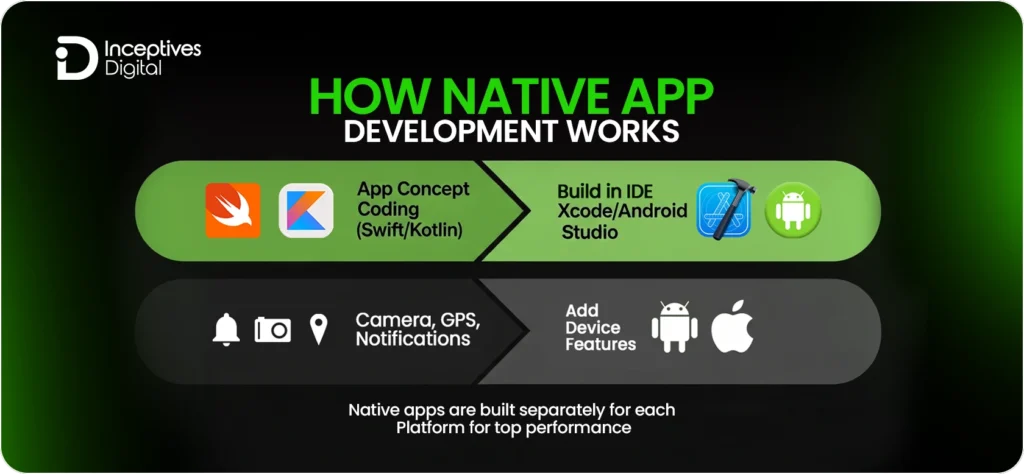
Building an application specifically for an operating system is called as Native app development approach. It could be either for Android or iOS, using the platform-specific tools, languages, and frameworks.
In Android app development, Kotlin or Java is used with the help of Android Studio (Android Development Environment). For iOS app development, Swift or Objective-C is used with Xcode (Apple’s Official development Environment). The advantages of Native apps are that they are faster, responsive, secure, and offer the best device features like GPS, camera, and sensors.
What Are the Pros and Cons of Native Apps?
| Pros | Cons |
| Superior performance and speed | Higher development cost (two separate apps for iOS and Android) |
| Full access to device features (camera, sensors, GPS) | Longer development timelines |
| Better user experience and smoother UI | Requires separate maintenance and updates |
| High security and reliability | Larger overall project budget |
| Ideal for complex or high-performance apps | Skilled developers for each platform are needed |
When Should I Choose Native Over Hybrid and Cross-Platform App Development?
If performance, security, and user experience are crucial for your application, then native app development is the only option. It’s ideal for applications that depend on a unique piece of device functionality, like mobile game development, fintech applications, or AR/VR applications, where a slight hiccup in performance could ruin the user experience.
Native development is also the best option for applications that need offline capability, advanced animations, or ultra-deep hardware integration. In the long run, you can expect better stability, responsiveness, and scalability with a native application, which is why native apps are preferred by companies focused on quality and reliability.
CTA SECTION START
cta title: Want to build a high-performance native app?
cta des: Let Inceptives Digital help you design and develop an app that runs seamlessly on both iOS and Android.
cta button: Start Your Native App Project
CTA SECTION END
What Is Hybrid App Development and Why Do Businesses Use It?
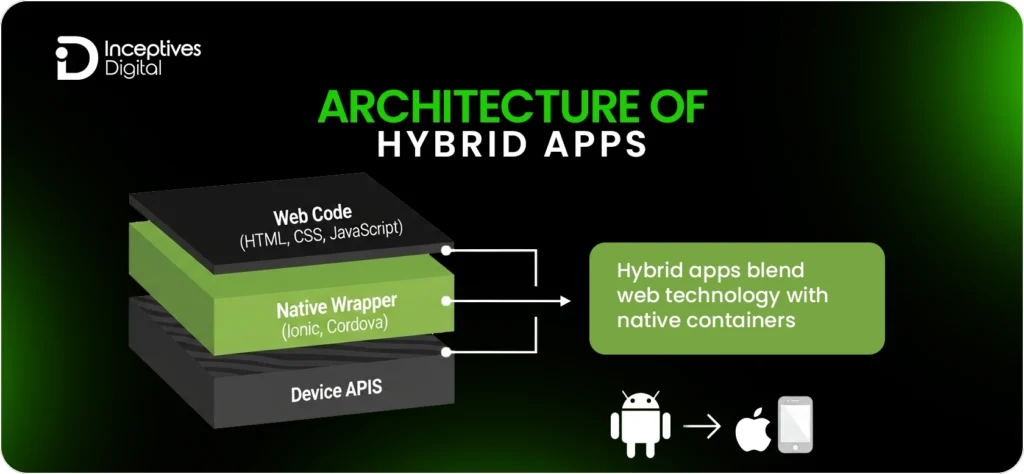
Hybrid app development represents a method of cross-platform development. It allows a developer to create an application using a single code base, built with HTML, CSS, and JavaScript, under a Native wrapper to provide a way to deploy on multiple platforms. The most extensively used frameworks are Ionic, Cordova, and React Native.
The top reason that attracts the development companies to choose Hybrid app development approach is that it combines both web and Native technologies, thus reducing the app development cost and timeline, while providing a near Native experience.
What are the pros and cons of hybrid App Development?
| Pros | Cons |
| One codebase for all platforms, reducing cost and development time. | Performance may be slower compared to native apps. |
| Easier maintenance and updates across platforms. | Limited access to device features and hardware-level functions. |
| Great for MVPs, internal tools, and content-based apps. | UI/UX may not feel fully native on every platform. |
When Should You Choose Over Native or Cross-Platform?
You should definitely choose the Hybrid app development approach if you are building a less complex application, the target audience is broad, but the budget is limited. It is a good option for MVP projects, evaluating an app development idea, or an application with simple features like booking apps, content-based apps, e-Commerce apps etc.
CTA SECTION START
cta title: Not sure if hybrid is the right fit?
cta des: Get expert guidance from Inceptives Digital before you make a decision.
cta button: Talk to an App Expert
CTA SECTION END
What Is Cross-Platform App Development?
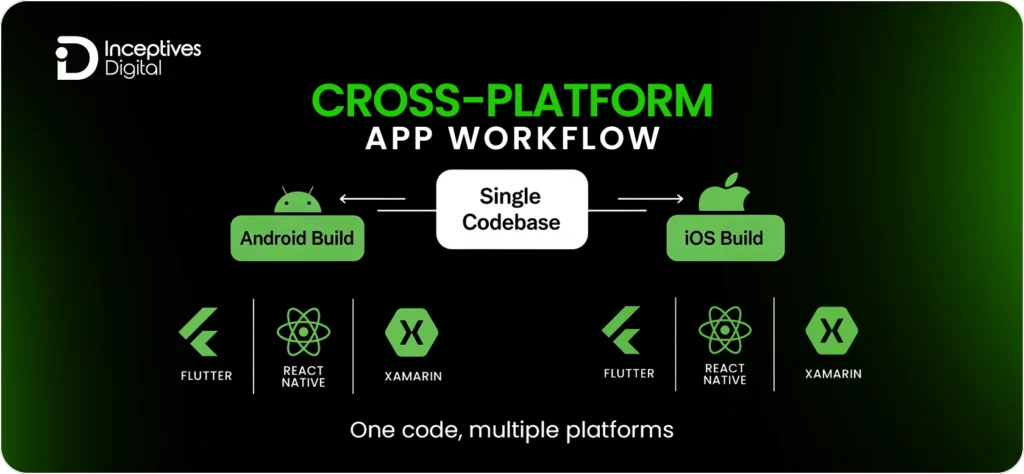
In contrast to the Hybrid approach, the cross-platform app development method leverages a single code base to deliver better usability and native-like performance on both iOS and Android. A cross-platform app development company uses frameworks like Flutter, React Native, and Xamarin because they allow us to write one code base that later on gets converted into Native components.
The frameworks above have distinct code architectures yet provide similar performance to that of the native applications. As an instance, Flutter app development includes the usage of the Dart language and a special rendering engine.
What Are the Pros and Cons of Cross-Platform App Development?
| Pros | Cons |
| A shared codebase across multiple platforms reduces costs and time-to-market. | Slightly lower performance than fully native apps in complex use cases. |
| Consistent UI and experience across iOS and Android. | Access to device-specific features may still require custom native code. |
| Easier maintenance and updates with one codebase. | Larger app sizes due to bundled frameworks and libraries. |
When to Choose Cross-Platform Over Native or Hybrid
Choose cross-platform development if your primary goal is to release the application across platforms in a short period of time while still receiving a good performance, design, and user experience.
This is ideal for startups and developing companies that want scalability and robust features at a fair price. Cross-platform development provides the best middle ground, being effective, reliable, and cost-effective..
Native vs Hybrid vs Cross-Platform App Development: Detailed Comparison
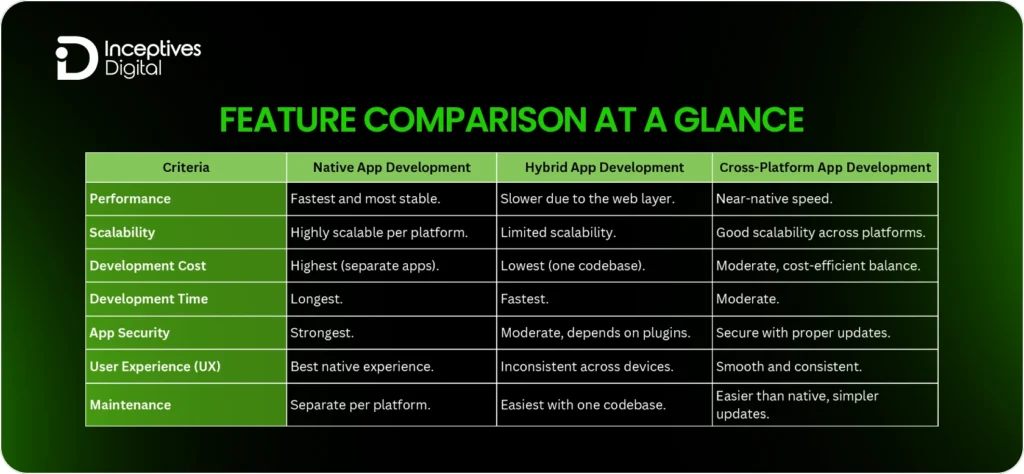
The choice of Native vs Hybrid vs Cross-platform app development methods depends on your specific needs. There is no ‘one-size-fits-all’ requirement list that determines what will be the best development approach for your needs. Each method has its pros and cons. You need to make an informed decision because it will have a direct effect on the success of the app.
Below, we have created a relatively complete comparison table that covers nearly every angle to help in your decision-making.
Feature Comparison Between Native vs Hybrid vs Cross-Platform App Development
Every method has its unique purpose, yet if your objective is to get launched quickly on several platforms while keeping the quality high, cross-platform app development will very likely be the most strategic option.
Cross-Platform vs Native vs Hybrid App Development Cost
The amount of money needed to create an application is determined by the selected method and the extent of its complexity. The most costly are usually native applications because of the need for distinct builds for both Android and iOS platforms. Hybrid applications are the least expensive, whereas cross-platform app development presents an equilibrium of cost, quality, and expansion.
Average App Development Cost Breakdown
| Development Approach | Estimated Cost Range (USD) | Best For |
| Native App Development | $50,000 – $250,000+ | High-performance apps with advanced features or complex integrations. |
| Hybrid App Development | $20,000 – $100,000 | MVPs, internal tools, or content-based apps with moderate functionality. |
| Cross-Platform App Development | $30,000 – $150,000 | Startups and businesses targeting both iOS and Android with balanced cost and quality. |
Best Frameworks and Tools for Native, Hybrid, and Cross-Platform App Development
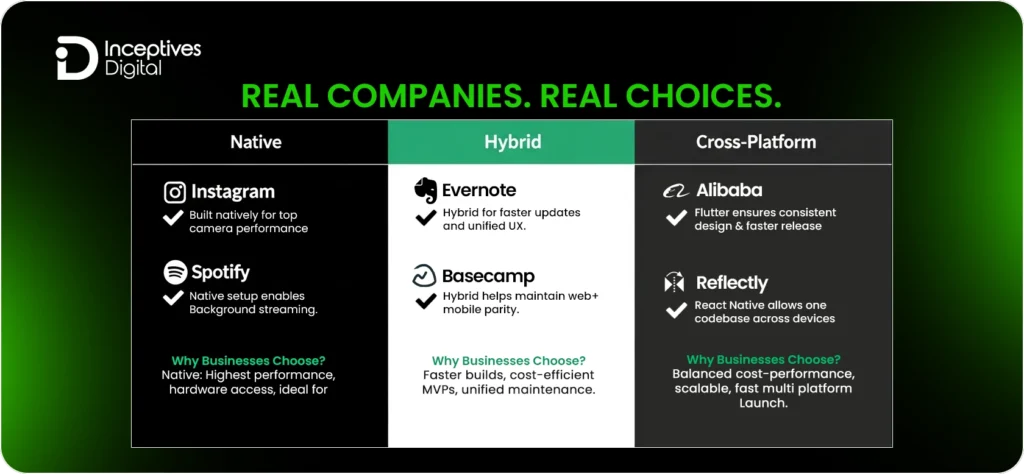
The choice of tools and frameworks can greatly affect the performance, scalability, cost, and timeline of development of an app. Depending on whether it is a native, hybrid, or cross-platform application, each has its own specific tool and related technologies, focusing on helping developers create a great app with as little effort as possible.
Top Frameworks for Native App Development
Android App Development:
- Kotlin: The official language for Android app development that comes along with pure short syntax and strong safety features.
- Java: Still the most secure and popular choice for enterprise-level development of Android projects.
- Android Studio: The best IDE from Google, offering very powerful debugging and performance features.
iOS App Development:
- Swift: Apple’s contemporary programming language, recognized for its performance and security.
- Objective-C: An Old language still used in a considerable number of current iOS applications.
- Xcode: Apple’s IDE that comes with tools for testing, designing, and deploying applications.
Top Frameworks for Hybrid App Development
- Ionic: Employs HTML, CSS, and JavaScript for constructing applications that operate within a native wrapper.
- Apache Cordova: Authorizes developers to use web technologies alongside the APIs of the native device.
- Framework7: Perfect for quick development of uncomplicated hybrid mobile and web apps.
Top Frameworks for Cross-Platform App Development
- Flutter: The open-source SDK developed by Google that uses Dart, delivering performance almost equal to native apps and providing a wide range of choices for UI design.
- React Native: Supported by Meta, it makes it possible to share code while maintaining native rendering quality.
- Xamarin: A framework of Microsoft that employs C# and .NET for the development of mobile applications with native-like characteristics.
- Unity: Normally associated with game creation, yet capable of producing interactive applications for multiple platforms as well.
Real-World Examples: Who Uses Which App Type and Why?

Understanding how leading firms in each app development approach are utilizing them and getting highly successful results can help you in choosing between native vs hybrid, vs cross-platform app development approaches. Below, we have listed the top companies for every app development method.
Native App Development Examples
1. Instagram (Originally Native)
Instagram was originally a native app that was built to leverage the camera and system features on the device. The native structure creates a better experience and a more consistent experience when working with media, which is important for sharing photos and videos.
2. Spotify
Spotify makes use of native development to deliver better performance for its app and support offline playback. Additionally, its native structure also allows for more complex integrations such as background streaming and advanced caching.
Why Businesses Choose Native:
- Highest speed and performance
- Access to all device hardware and APIs
- Best suited for complex, feature-rich, or graphics-heavy apps
Hybrid App Development Examples
1. Evernote
Evernote employed a mixed strategy at first to create a uniform experience across different platforms. It was greatly beneficial for the team to quickly introduce new features while also controlling the expense of development at an affordable level.
2. Basecamp
Basecamp uses hybrid technology to support its internal project management tools. The approach allows them to maintain web functionality and native accessibility at once.
Why Businesses Choose Hybrid:
- Faster development cycles
- Lower cost for MVPs or internal tools
- Easier updates across iOS and Android
Cross-Platform App Development Examples
1. Alibaba
Alibaba’s team adopted Flutter app development to achieve a consistent UI and high performance across devices. The framework’s single codebase helped them accelerate release cycles while keeping the design uniform.
2. Reflectly
Reflectly is a React Native based app, which means it is built to work on both Android and iOS by using one codebase. This makes updates and maintenance simpler while still providing an intuitive design for the user.
Why Businesses Choose Cross-Platform:
- Faster launch across multiple platforms
- Balanced performance and cost
- Easier maintenance and scaling
CTA SECTION START
cta title: Inspired by these examples?
cta des: Let Inceptives Digital help you plan and build an app tailored to your goals.
cta button: Plan My App Project
CTA SECTION END
How to Choose the Right Approach for Your Business
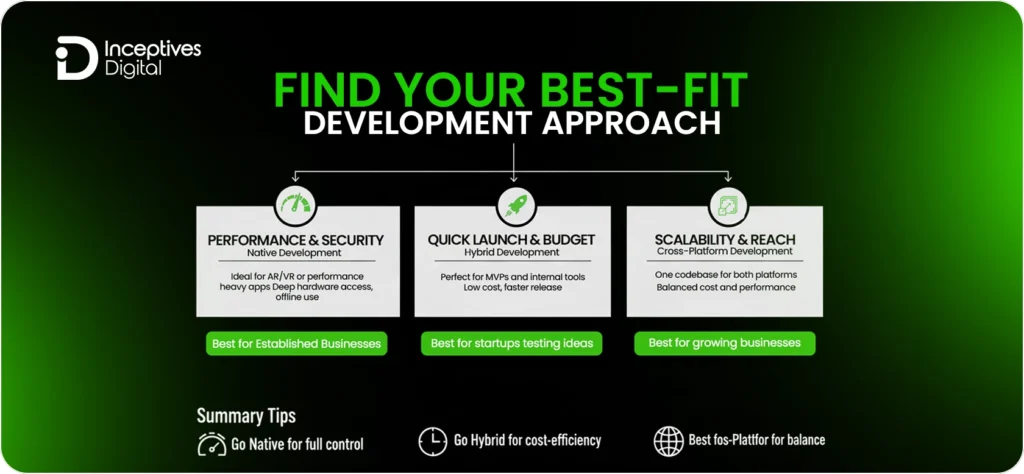
The decision to build a native, hybrid, or cross-platform app will largely depend on what you are trying to achieve and your app development budget and timeline. These approaches differ not by right or wrong but by different needs.
1. Choose Native App Development If
You’re focused on performance, security, and user experience.
Native apps are ideal for:
- High-performance apps like gaming or AR/VR
- Complex Android app development or iOS app development with advanced features
- For businesses that require offline functionality or thorough hardware integration.
Most suitable for: developed companies that are getting ready for the long run with scalable apps.
2. Choose Hybrid App Development If
You wish for a speedy launch with few resources.
Hybrid apps are suitable when:
- You are running a trial or developing a minimum viable product
- The application does not need deep integration with the device
- You want quicker development and easier maintenance
Ideal for: Startups or companies with small budgets that are planning to test their idea in a fast way.
3. Choose Cross-Platform App Development If
You are focusing on both Android and iOS customers simultaneously by using one codebase. Cross-platform applications provide a mixture of good performance and low price. They are perfect in the following situations:
- The product needs to be launched in a very short time
- Uniformity among devices is a must-have
- You are able to cut down the development expense but still get the main features of the product.
Ideal for: Businesses that are developing and looking for a cost-effective way to present a similar UX on multiple platforms at the same time.
Final Tip
In case your company considers quality performance and ultimate management as a main priority, then the native option is recommended. But if speed and cost-effectiveness are the deciding factors, then hybrid or cross-platform solutions are the right choice. Moreover, if you seek a perfect compromise, the cross-platform app development using Flutter or React Native frequently yields the best ROI.
CTA SECTION START
cta title: Still unsure which direction to take?
cta des: Schedule a free consultation with Inceptives Digital and get a custom app development roadmap.
cta button: Schedule a Free Consultation
CTA SECTION END
The Future of Native, Hybrid, and Cross-Platform Development
As mobile technology evolves, the boundaries between native, hybrid, and cross-platform app development are becoming less distinct. New frameworks and tools are improving performance, security, and scalability across all three approaches — changing how businesses choose their tech stacks.
1. Native Development: Powering Performance-Driven Apps
Native app development will continue to lead in areas demanding high performance and deep hardware integration. With ongoing advancements in Swift, Kotlin, and platform-specific SDKs, mobile app developers can build apps that fully utilize device capabilities like AR, sensors, and advanced camera APIs. Expect native apps to remain dominant in gaming, fintech, and AR/VR experiences where speed and responsiveness are critical.
2. Hybrid Development: Faster MVPs and Internal Solutions
Hybrid development is finding its niche among businesses seeking rapid prototyping and budget-friendly solutions. With web technologies becoming more powerful and browser APIs improving, hybrid apps are expected to offer smoother performance than before. For startups or enterprises focusing on content delivery, internal tools, or MVP launches, hybrid frameworks like Ionic and Cordova will remain practical choices.
3. Cross-Platform Development: The Growing Middle Ground
Cross-platform frameworks are shaping the future of scalable app delivery. Flutter app development and React Native are bridging the performance gap between native and hybrid, providing near-native speed with a single codebase. As these frameworks mature, they’re becoming the go-to option for businesses looking to balance cost-efficiency and performance without compromising user experience.
4. Integration of Emerging Technologies
Emerging tech will further influence how these approaches evolve. For example:
- Blockchain app development will demand secure, high-performance architectures — favoring native or optimized cross-platform builds.
- AI and machine learning will enhance automation and personalization across all app types.
- 5G and IoT will push developers to build lighter, faster apps that process data in real-time.
5. Convergence Ahead
Over the next few years, the distinction between native, hybrid, and cross-platform apps will continue to blur. Frameworks like Flutter and Kotlin Multiplatform are already blending the best of both worlds — offering native performance with cross-platform flexibility.
Key Takeaway:
The future isn’t about choosing just one approach but understanding how native, hybrid, and cross-platform development can complement different business needs. Companies that stay flexible and leverage the right technology for each project will have a lasting edge in performance, scalability, and innovation.
Choose the Right App Development Approach with Inceptives Digital
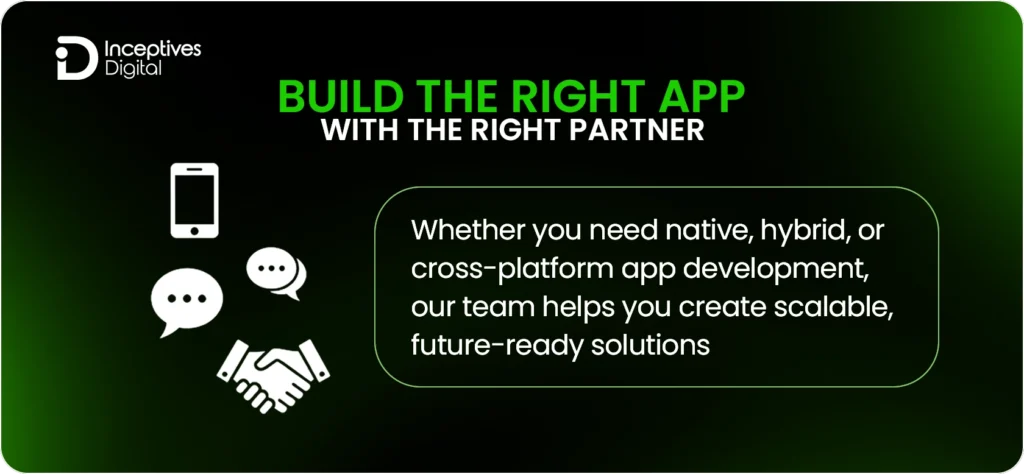
We hope that after reading this blog, you will have a clear answer to the question of which one to choose between Native vs Hybrid vs cross-platform app development approaches. The right decision depends on your objectives, target audience, and the experience you want to provide.
If you still have doubts and questions bothering you, contact us to discuss your idea and unique requirements. At Inceptives Digital, we have helped 70+ businesses, from choosing the right development approach to the launch of their applications. Let our expert app development team build a custom software development strategy for you that aligns with your specific business goals.
CTA SECTION START
cta title: Future-proof your mobile strategy with expert guidance.
cta des: Contact Inceptives Digital to discover how emerging tech can shape your app’s success.
cta button: Contact Us Today
CTA SECTION END
Frequently Asked Questions
Native apps are the most time-consuming since they are developed for both iOS and Android. Hybrid apps, on the other hand, are the fastest because of a single codebase, whereas cross-platform apps are close to native speed but with shared code that puts them in between.
Native apps are the main security winners, as they incorporate the use of platform-specific features. Hybrid and cross-platform apps can also be secure, but they are more dependent on coding standards and third-party plugins for support.
Native apps are the ones that scale best in terms of performance and a large user base. To a lesser extent, cross-platform apps can also handle growth with some optimization, while a hybrid has less flexibility in scaling complex features.
Native apps require separate updates for each of the operating systems. Maintenance is simpler and less costly for hybrid and cross-platform applications since a single code base caters to all devices.
If the budgets are tight or there are strict deadlines, hybrid and cross-platform approaches will be the chosen ones. Native development is a long-term investment that is worth it with regard to the best performance, security, and scalability.
SIDEBAR LIST START
- Introduction
- What Is Native App Development
- What Is Hybrid App Development
- What Is Cross-Platform App Development
- Pros and Cons of Native App Development
- Pros and Cons of Hybrid App Development
- Pros and Cons of Cross-Platform App Development
- When Should You Choose Native Over Hybrid or Cross-Platform
- When Should You Choose Hybrid Over Native or Cross-Platform
- When Should You Choose Cross-Platform Over Native or Hybrid
- Real-World Examples: Who Uses Which App Type and Why
- How to Choose the Right Approach for Your Business
- The Future of Native, Hybrid, and Cross-Platform Development
- FAQs
- Conclusion
SIDEBAR LIST END